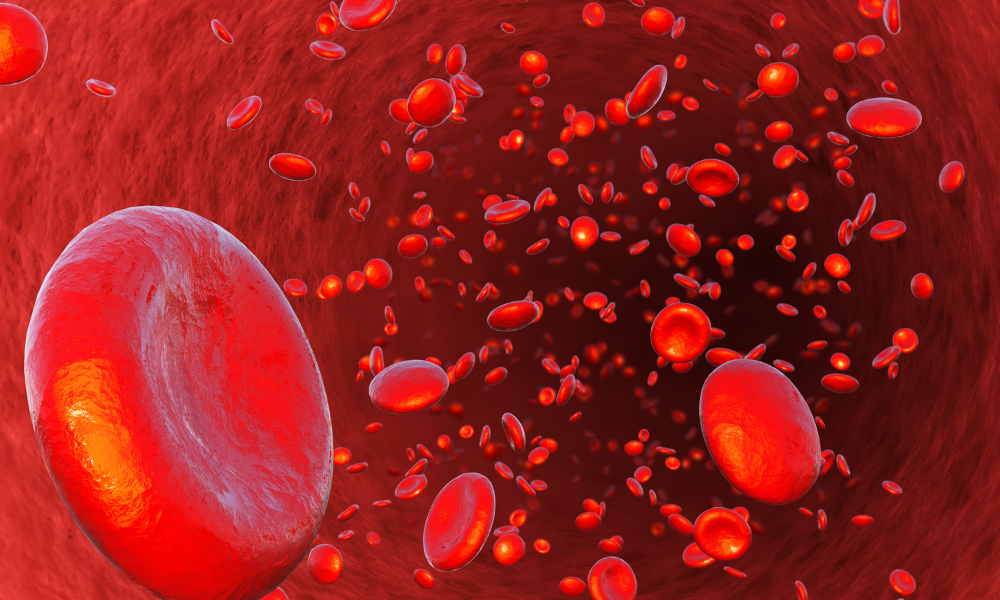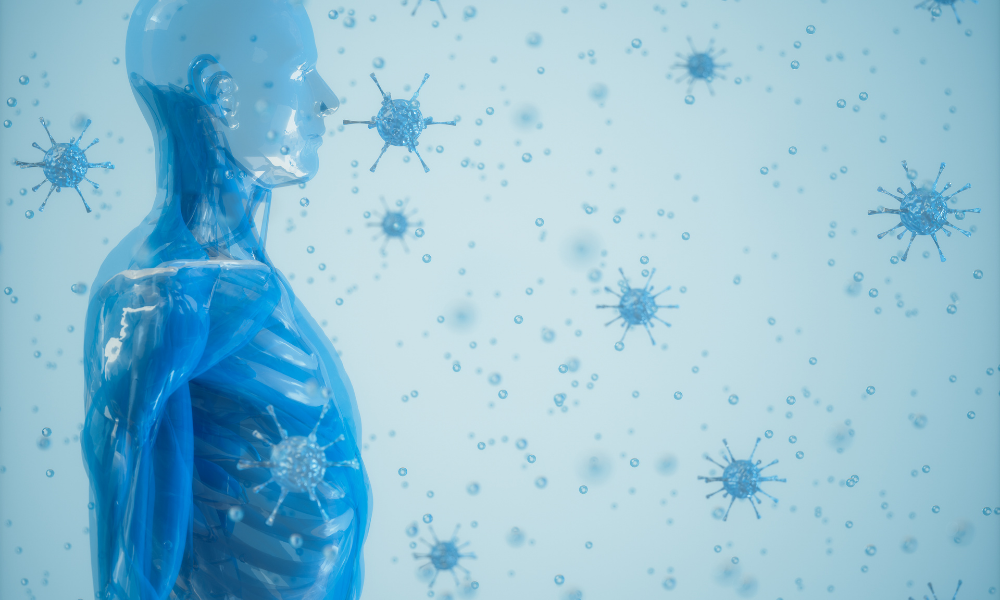Do you remember the old zinc bathtubs that people used to use and that are now often used as decoration in some gardens? Of course, this article is not about them! We are dealing with the trace element zinc, which performs some pretty important tasks in your body and is generally greatly underestimated. So after reading the article, you will be able to talk about more than just bathtubs when it comes to zinc.
IT'S WORTH READING!
AT THE END OF THE ARTICLE WE WOULD LIKE TO GIVE YOU A LITTLE JOY WITH A VOUCHER!
What is zinc actually?
After iron, zinc is the second most abundant trace element in your body and is present in every cell, as confirmed by a study published in the journal Nutrients .
In the periodic table of elements, the brittle, bluish-white metal is classified as a transition element.
In our body, the trace element plays an important role as a component of important enzymes in immune function, DNA synthesis and wound healing, among other things. All good reasons why a constant supply of zinc must be provided either through food or through high-quality nutritional supplements .
The role of zinc in the body
The vital mineral zinc is used for many processes in the body. It can be found in the eyes, bones, liver, skin and even in the male reproductive organs. Because our bodies cannot produce zinc themselves and can only store it in small amounts for a short period of time, we must regularly ingest this mineral from outside. This normally occurs through food.
Zinc is necessary for the activity of over 300 enzymes that support metabolism, digestion, nerve function and many other processes. This was shown by a study published in the scientific journal Biochemistry .
And did you know that zinc is also important for your sense of taste and smell? One of the enzymes that is crucial for proper sense of taste and smell depends on this nutrient. A 2012 study published in the Journal of Pain and Palliative Care Pharmacotherapy showed that a zinc deficiency can affect your ability to taste or smell.
Vegetarians and vegans should pay particular attention to their zinc levels. Plant-based foods such as vegetables, pulses and grains contain smaller amounts of zinc than meat. And the body can only absorb it to a limited extent.
Let’s take a closer look at the positive properties of this trace element.

The health benefits of zinc
We have already given some examples of why zinc is important for your body. Let's take a closer look at the whole thing.
Zinc and the function of the immune system
Your immune system is a masterpiece! And zinc helps ensure that this masterpiece does not get out of balance. That is why a deficiency can lead to a weakened immune response.
This was suggested by an analysis of seven studies. In 2017, it concluded that taking 80 - 92 mg of zinc per day could reduce the duration of a cold by up to 33 percent.
In addition, zinc supplements could reduce the risk of infections and may be suitable for infection prophylaxis.
Zinc as cell protection against oxidative stress
Zinc could help reduce oxidative stress. At least that is what a study published in the journal Advances in Experimental Medicine and Biology suggests.
Another 2010 study of 40 older adults found that those who took 45 mg of zinc per day had greater reductions in inflammatory markers than the placebo group.
Zinc and wound healing
Zinc is often used in hospitals to treat burns, certain ulcers and other skin injuries. The reason: Because it plays a crucial role in collagen synthesis, immune function and the inflammatory response, it may be necessary for wound healing.
As a study published in the international journal Wound Repair and Regeneration showed, a 12-week study of 60 people with diabetic foot ulcers found that, for example, those treated with 200 mg of zinc per day experienced a significant reduction in ulcer size compared to the placebo group.

Zinc and the skin
Acne is a common skin disease that, according to an article in the Apotheken Umschau, affects around 85 percent of the population. It is caused by a blockage of the sebum-producing glands, bacteria and inflammation.
A study published in the journal Dermatologic Clinics suggests that both topical and oral zinc treatments can effectively treat acne by reducing inflammation, inhibiting the growth of P. acnes bacteria, and suppressing the activity of sebaceous glands.
Because people with acne tend to have low zinc levels, supplements may also help reduce symptoms.
Zinc and age-related diseases
Zinc can therefore protect the body from infections. It does this by reducing oxidative stress and supporting the immune response. It increases the activity of T cells and natural killer cells and could thus help to significantly reduce age-related diseases such as pneumonia, infections and age-related macular degeneration (AMD). This is the claim of a study published in 2009 in the journal Immunity & Ageing .
In fact, older adults who take a zinc supplement report an improved response to, for example, the flu shot and increased mental performance.
In fact, another study from 2013 showed that after a daily supplement of 45 mg of zinc, infection rates in older adults fell by almost 66 percent.

Deficiency symptoms and overdose
How much zinc is healthy per day? Because the body absorbs around 30 percent of the zinc it consumes, the German Nutrition Society (DGE) recommends 8 mg of zinc per day for women and 14 mg for men. Depending on their age, infants need 1 mg to 2 mg per day. The daily requirement of children also depends on their age and, from the age of 10, on their gender.
Although severe zinc deficiency is not common, it can occur in people with rare genetic mutations or in infants born to nursing mothers who do not receive enough zinc. Zinc deficiency can also occur in people who are addicted to alcohol and in people who take certain immunosuppressive medications.
This is indicated by symptoms such as diarrhea, impaired wound healing, eczema, perception problems or susceptibility to infections.
The World Health Organization (WHO) even estimates that 31 percent of the world's population is affected by zinc deficiency.
But just as a zinc deficiency can lead to health complications, too much zinc can also have negative side effects. According to a 2007 study, the most common cause of what is known as zinc toxicity is too much supplemental zinc, which can cause both acute and chronic symptoms.
In addition to nausea and vomiting, loss of appetite, diarrhea, abdominal cramps or headaches, reduced immune function or reduced HDL cholesterol levels are among the signs of excessive intake of the mineral.
In fact, excessive zinc intake can even lead to other nutrient deficiencies. A study first published in the journal Children observed a reduction in copper levels in people who took moderate doses of zinc - 60 mg per day - for 10 weeks.
So what is the best diet?
Zinc in food
Many animal and plant foods are naturally rich in zinc. The DGE lists some of them on its website, including
- beef
- pork
- Cheese
- Milk
- Eggs
- Wheat or rye sprouts
- Nuts such as cashews and pecans
Conclusion: Your body cannot avoid zinc
Zinc is a versatile trace element that is involved in many different processes in the body. These include wound healing, immune function, nerve function, metabolism and digestion.
Because the trace element can only be stored in the body for a short time, it must be absorbed through food or by means of high-quality zinc supplements .
However, care should be taken not to take too much zinc. Therefore, you should always seek advice from your GP if you think you are suffering from a zinc deficiency
AS PROMISED, YOU WILL RECEIVE A 10% VOUCHER ON OUR ZINC DROPS and ZINC/COPPER .
SIMPLY COPY THE CODE ZINK+V10 AND ENTER IT AT CHECKOUT.
Click here to shop
[1] https://www.dge.de/forschung/weitere-publikationen/faqs/zink/?L=0
[2] https://www.ncbi.nlm.nih.gov/pmc/articles/PMC3775249/
[3] https://pubmed.ncbi.nlm.nih.gov/24506795/
[4] https://www.ncbi.nlm.nih.gov/pmc/articles/PMC2277319/
[5] https://pubmed.ncbi.nlm.nih.gov/23914218/
[6] https://www.ncbi.nlm.nih.gov/pmc/articles/PMC5872795/
[7] https://www.ncbi.nlm.nih.gov/pmc/articles/PMC4042409/
[8] https://pubmed.ncbi.nlm.nih.gov/28515951/
[9] https://www.ncbi.nlm.nih.gov/pmc/articles/PMC2702361/
[10] https://www.ncbi.nlm.nih.gov/books/NBK6288/
[11] https://www.ncbi.nlm.nih.gov/books/NBK493173/
[12] https://www.ncbi.nlm.nih.gov/pmc/articles/PMC2869512/
[13] https://www.ncbi.nlm.nih.gov/pmc/articles/PMC4413488/
[14] https://www.ncbi.nlm.nih.gov/pmc/articles/PMC5793244/
[15] https://pubmed.ncbi.nlm.nih.gov/28395131/
[16] https://pubmed.ncbi.nlm.nih.gov/25597339/
[17] https://pubmed.ncbi.nlm.nih.gov/29193602/
[18] https://pubmed.ncbi.nlm.nih.gov/20510767/
[19] https://www.ncbi.nlm.nih.gov/pmc/articles/PMC4135093/
[20] https://www.ncbi.nlm.nih.gov/pmc/articles/PMC2702361/
[21] https://pubmed.ncbi.nlm.nih.gov/18341424/
[22] https://www.ncbi.nlm.nih.gov/pmc/articles/PMC3649098/
[23] https://pubmed.ncbi.nlm.nih.gov/23644932/
[24] https://www.dge.de/forschung/referenzwerte/zink/?L=0
[25] https://www.ncbi.nlm.nih.gov/pmc/articles/PMC4902399/
[26] https://www.ncbi.nlm.nih.gov/pmc/articles/PMC4175048/
[27] https://pubmed.ncbi.nlm.nih.gov/18270521/
[28] https://pubmed.ncbi.nlm.nih.gov/17914213/
[29] https://www.ncbi.nlm.nih.gov/pmc/articles/PMC4928738/
[30] https://www.dge.de/forschung/weitere-publikationen/faqs/zink/?L=0#c8185

















